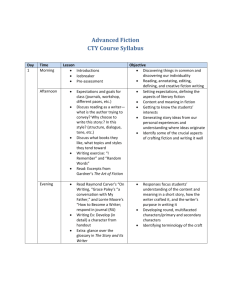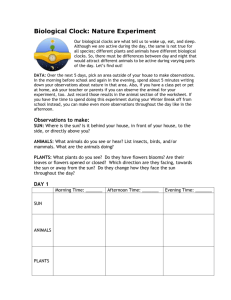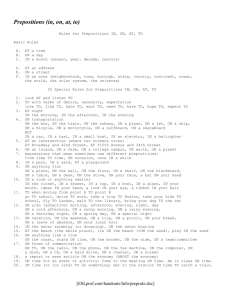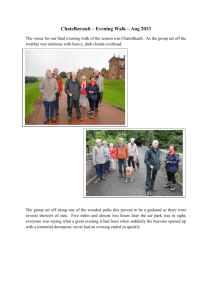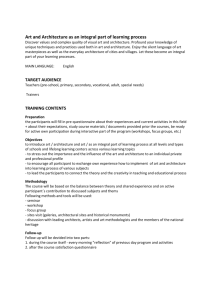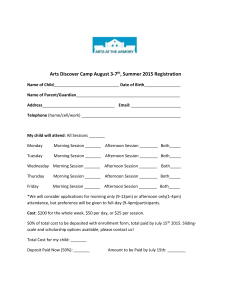Sample syllabus 1
advertisement
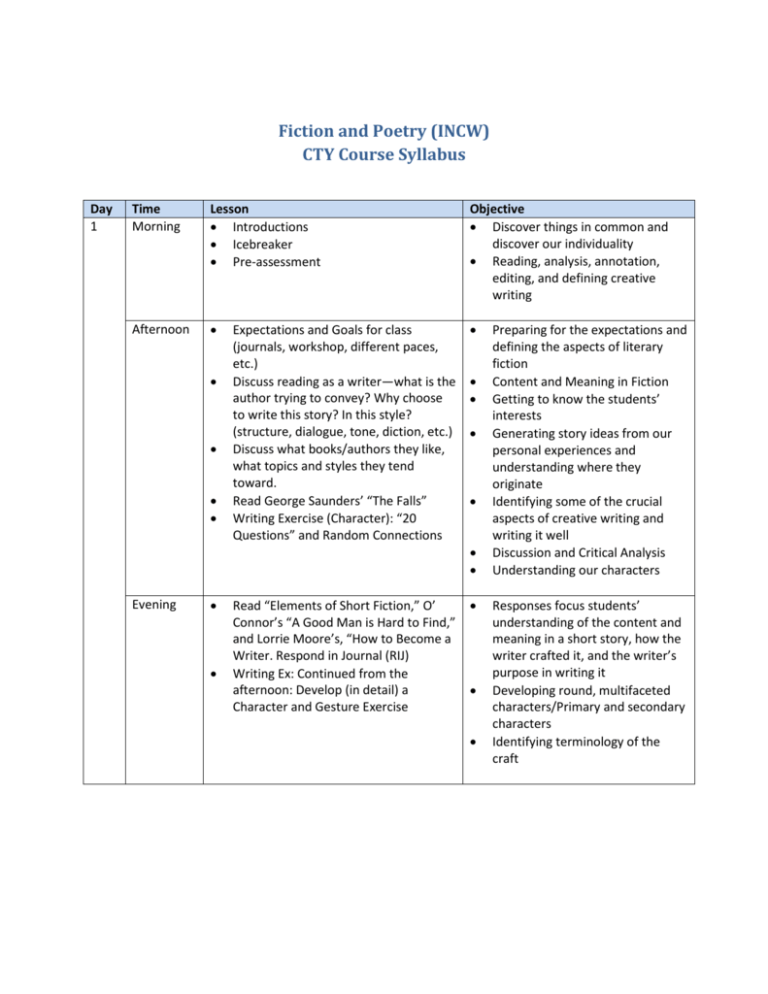
Fiction and Poetry (INCW) CTY Course Syllabus Day 1 Time Morning Lesson • Introductions • Icebreaker • Pre-assessment Objective • Discover things in common and discover our individuality • Reading, analysis, annotation, editing, and defining creative writing 1 Afternoon • • • • • • 1 Evening • • Expectations and Goals for class (journals, workshop, different paces, etc.) Discuss reading as a writer—what is the author trying to convey? Why choose to write this story? In this style? (structure, dialogue, tone, diction, etc.) Discuss what books/authors they like, what topics and styles they tend toward. Read George Saunders’ “The Falls” Writing Exercise (Character): “20 Questions” and Random Connections Read “Elements of Short Fiction,” O’ Connor’s “A Good Man is Hard to Find,” and Lorrie Moore’s, “How to Become a Writer. Respond in Journal (RIJ) Writing Ex: Continued from the afternoon: Develop (in detail) a Character and Gesture Exercise • • • • • • • • • Preparing for the expectations and defining the aspects of literary fiction Content and Meaning in Fiction Getting to know the students’ interests Generating story ideas from our personal experiences and understanding where they originate Identifying some of the crucial aspects of creative writing and writing it well Discussion and Critical Analysis Understanding our characters Responses focus students’ understanding of the content and meaning in a short story, how the writer crafted it, and the writer’s purpose in writing it Developing round, multifaceted characters/Primary and secondary characters Identifying terminology of the craft Day 2 Time Morning Lesson • (Continued) Reading and Exercises/Group Work • Discuss: George Saunders’ “The Falls” Personal Experience and Character • POV Exercise/”The Lens” • Group Exercise Objective • Critical Analysis: Personal Experience and Character • POV, Diction Language, and Voice • Understanding Narrative Perspective/ Compression of Time/Authenticity in a work of Fiction • Abstract ideas and distinct language 2 Afternoon • • Perspective/“Psychic Distance” Brainstorm on the board common clichés & cliché storylines, etc. (handout) Discuss Moore/Taboo Subjects & Cliché: How to use it effectively Writing Exercises: Character and Scenes Read and Discuss Plot Writing Exercises: Use Character/Cliché Exercises to Develop Opening Scenes • Read: Elements of Fiction/Formalist Criticism Raymond Carver’s “Cathedral” “The Well-chosen Modifier” – Write a story with no adjectives or adverbs (1015 minutes) Writing Exercise: “Cutting the Fat” • • • “The Coffee Shop”/Cornerhouse Commons or The Quarry Writing Ex: “Finding Fiction,” “Random Connections,” and “Sparkwords” (exercises) • • Activity: “Exquisite Corpse” Discuss: Carver • • • • 2 Evening • • • • 3 3 Morning Afternoon • • • • • • • • • • • (Continued)Understanding and applying Narrative Perspective Reading writing about writing, deconstructing a story, and understanding the writer’s objective Understanding Literary Fiction vs. Genre Fiction Writing Skills Choosing the proper POV Analytical reasoning and responding to reading The power of simplicity: understanding how additives can be unnecessary and too easy, ala Carver Specific Word Choice/Concrete Nouns and Active Verbs Begin Short Story and draw the opening Scene/“Story Maps” Individual Instructor Advice Application of Terminology and technique to words Theme and Meaning through Subtext Effective use of Dialogue (i.e.) Direct vs. Indirect Discourse Day 3 Time Evening Lesson • Read: Rick Moody’s, “Boys,” Jamaica Kincaid’s, “Girl’” and Gabriel Garcia Marquez’, “The Very Old Man with Enormous Wings” • Writing Ex.: Magic Realism 4 Morning • • • Objective • Detail, Metaphor Imagery, and Setting and Mood • Cadence and Tone • Magic Realism Continue reading and responding to • Readings, if necessary Exercise: Reading and Responding/Pairs Activity: “Balderdash” • • 4 Afternoon • • • • • Discuss: Moody and Kincaid Writing Exercise: “Playing With Unconventional Narratives” Writing—Short Stories • The Tip of the Iceberg: Understanding how what’s left “unsaid” in a story can inform the reader/Interpretation and Inference Developing Discussion Questions and Thoughts Developing Discussion Tactics Economy of Language Stream of Consciousness/ Integrated Theme Sharing and Critiquing work 4 Evening • Film: Mapping Your Story • Understanding Narrative Arc and Structure 5 Morning • Writing Lab • Crafting the Short Story 5 Afternoon • Vladimir Nabokov’s “Signs and Symbols” • Metaphor and Meaning/Reading For JOY: Writing Skills 5 • Writing Lab (7-9 pm) • Continue writing Short Stories 6 Evening (Sunday) Morning • • Writing Lab Individual Conferences with Instructor • Writing skills 6 Afternoon • Writing Lab • Writing skills 6 Evening • Read and Critique/Respond to Stories 1-4 • Preparing for Workshop and Applying Reading Response Skills 7 Morning • • Writing Lab Audio Story: Joe Hill, “Pop Art” • • Finish First Drafts and Responses Cadence, Rhythm, Tone, Technique 7 Afternoon • Workshop Stories 1-4 • Application of Skills Day 7 Time Evening Lesson • Read and Critique/Respond to Stories 5-8 8 Morning • Workshop Stories 5-8 8 Afternoon • • Read—Intro to Poetry Writing Exercise: “Stick on Tattoo Poetry” Read Selected Poems from the Text • Objective • • • Things to Avoid/Things to Achieve with Poetry Getting Started Understanding Form and Meaning 8 Evening • Read and Critique/Respond to Stories 9-13 9 Morning • Workshop Stories 9-13 9 Afternoon • • Scansion and Fixed Form Read Selected Poems • Learning “The Rules” 9 Evening • • Irregular and Open Forms Read Selected Poems • “The Rules” and How to Break Them 10 Morning • • • Writing Lab Mini Workshops Instructor Conferencing • Skills: Fixed Forms 10 Afternoon • • • Writing Lab Mini Workshops Instructor Conferencing • Skills: Irregular and Open Forms 10 Evening (Sunday) • Read and Critique/Respond to Poems 1-7 11 Morning • • • • Writing Lab Mini Workshops Instructor Conferencing Discussion: Story and Structure/Revision and Editing • Understanding Structure and Identifying Areas for Revision 11 Afternoon • • Workshop Poems 1-7 Music and Poetry • Writing and Responding to the Arts 11 Evening • Read and Critique/Respond to Poems 8-13 Day 12 Time Morning Lesson • Workshop Poems 8-13 12 Afternoon • • Writing Lab: Revision Instructor Conferencing 12 Evening • • Finish Workshops Reflect on Workshop Experience 13 Morning • Writing Lab: Revision 13 Afternoon • Writing Lab: Revision 13 Evening • • Review for Post Assessment Writing Exercise: “Listening” • • Terminology and Craft Review Inspiration 14 Morning • • • Reacting to Music through Poetry and Prose Assemble Anthology Poetry/Fiction and Expanding Horizons • Assessment of Skills • Guide students in continued learning after the program; frame writing as a lifetime pursuit 14 Afternoon • Post Assessment 14 Evening • Students Read from Anthology 15 Morning • Discuss Where Students Want to Go Next with Their Writing Objective
